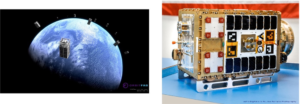Marubeni Ventures Announces Investment in Orbit Fab, Developing “Gas Stations in Space” to Commercialize On-Orbit Refueling for Satellites

Marubeni Ventures Inc. announces its investment in Orbit Fab (Headquarters: California, Co-Founder & CEO: Daniel Faber), which develops “Gas Stations in Space” to commercialize on-orbit refueling for satellites along with companies such as Northrop Grumman and Lockheed Martin Ventures.
Founded in 2018, Orbit Fab has been building an infrastructure that enables satellites to be easily refueled in orbit. Orbit Fab’s architecture is a straightforward system of Tankers which hold fuel and Fuel Shuttles that deliver fuel to satellites in LEO, GEO, and cislunar space. Accessing fuel in-orbit will allow satellite operators to defer capital costs, increase asset utilization and lifetime, and create the opportunity for new, flexible business models. Orbit Fab expects this refueling infrastructure to underpin the emergence of a bustling in-space economy.
Orbit Fab’s first product is the Rapidly Attachable Fluid Transfer Interface (RAFTI), a fueling port that can be used as a drop-in replacement for existing satellite fill-and-drain valves. The RAFTI fueling port has proven flight heritage from its flight on “Tenzing,” the world’s first onorbit fuel depot, which was successfully launched in June 2021. Prior to that, in 2019, Orbit Fab was the first private company to resupply the ISS with water, qualifying the company’s feed systems and flex tank to NASA standards for crew-rated systems in just six months.
Through this investment, Marubeni Ventures will support Orbit Fab’s business
Orbit Fab
Headquarters: US, California (Soon to be US, Colorado)
Co-Founder & CEO: Daniel Faber
Co-Founder & CDO: Jeremy Schiel
Shareholders: Northrop Grumman, Lockheed Martin, Bolt, SpaceFund, Asymmetry Ventures, Munich Re Ventures, Techstars, etc.
Orbit Fab is a venture-backed startup with a vision of a bustling in-space economy that supports both existing space businesses (communications and Earth observation) and new industries like space tourism, manufacturing and mining. The first step is achieving ubiquitous availability of satellite propellant in Earth Orbit, expanding the operational potential of new and existing space assets and providing unprecedented business model flexibility for satellite owners. The future for satellites is no longer restricted to the fuel they are launched with. It is about getting the fuel and other materials they need, where and when they need it, to enable business models never before thought possible.
To view in a PDF format, please click here.
